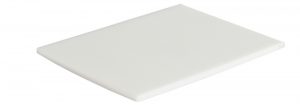PTFE seals
PTFE is the abbreviation for polytetrafluoroethylene, an unbranched, linear and semi-crystalline polymer made of the elements fluorine and carbon and is usually a white and odourless solid that belongs to the group of thermoplastics. The best-known trade name for this material, developed in 1938, is probably Teflon™. Another well-known trade name for membranes made of this material is Gore-Tex®.
Flat gaskets made of this material are considered to be almost universally chemically resistant and have a high adaptability. The reason for this is that seals made of PTFE require a low surface pressure in order to achieve the required leakage rates. Due to the physiological harmlessness of this material, its use in the food, medical and pharmaceutical industries is widespread.

Available PTFE qualities at Rehm Dichtungen Ehlers GmbH
If you require seals for chemically demanding environments or in the food or pharmaceutical industries, you can rely on our high-quality PTFE flat seals. In our stock program we keep the material available as sheet material.
We distinguish between two different types of this material. On the one hand, we carry pure PTFE (virgin), which is characterized by its approval for food contact. On the other hand, we offer filled PTFE. The addition of fillers has a positive effect on the properties of the material. Compared to virgin PTFE, the improved mechanical properties, such as pressure resistance and the reduction of creep and cold flow, are particularly noteworthy. The most important fillers for polytetrafluoroethylene in the sealing industry are micro hollow glass beads, barium sulfate and silicate.
Qualities
PTFE 25% glass fibre
This sealing material consists of 25% glass fibres and has virginal better wear properties compared to PTFE.
Technical data sheet:
Properties:
| Density [kg/cm³] | 2,21 - 2,35 |
| Tensile strength [MPa] | 15 +- 3 |
| Elongation at break [%] | 250 +- 50 |
| Compressive force [N/mm²] | 40 |
| Temperature range | -180° - +280° C |
PTFE virginal
Approved for contact with food: EG 1935/2004 (& EU10/2011).
Technical data sheet:
Properties:
| Density [kg/cm³] | 2,21 - 2,35 |
| Tensile strength [MPa] | ≥ 25 |
| Melting point | 327° C |
| Temperature range | -180° - +260° C |
The properties of PTFE as a sealing material
Polytetrafluoroethylene is a polymerization of tetrafluoroethylene and has the highest degree of fluorination and is therefore non-flammable. In addition, PTFE or Teflon™ has good non-stick properties due to a very low coefficient of friction. This material is a high-performance polymer with high dielectric properties and is therefore considered insulating. It should also be emphasized that PTFE seals are UV and weather resistant and also ensure simplified disassembly thanks to a low-adhesion surface.
The sealing material polytetrafluoroethylene is considered thermally stable and retains its mechanical properties in the temperature range from -200° C to +260° C. Due to the high possible temperatures, flat gaskets made of PTFE are among the heat-resistant gasket materials. However, use of the flange gaskets at temperatures above 260° C should be avoided, as the material decomposes to form toxic and corrosive gases. In such applications, flat gaskets made of graphite can be used, since graphite gaskets, just like gaskets made of PTFE, are universally chemically resistant.
With regard to the chemical properties of this material, it can be stated that PTFE seals have outstanding chemical resistance to almost all chemicals and are thus considered to be universally chemically resistant. Aggressive chemicals, concentrated acids and alkalis, strongly oxidizing substances and solvents have no effect on the seal.
With the aid of the aforementioned chemical stability, the material is considered biocompatible and physiologically safe. Finally, our virgin PTFE has EC 1935/2004 approval and is FDA-compliant. For this reason, the sealing material is used for applications in the food industry and in medical technology.
The advantages and material properties of PTFE at a glance
This thermoplastic is a particularly suitable material for use in environments with high thermal requirements. At the same time, the sealing material has diverse chemical properties and is thus considered to be universally resistant.
PTFE is resistant to:
- Heat
- Weather and ozone
- Light
- Abrasion resistance
- Petrol/Diesel
- Water at 100° C
- Oils, alkalis and acids
Furthermore, the material is antistatic as well as a good insulator. According to food regulations such as EC 1935/2004 (& EU10/2011), the material can be used in contact with food. Thanks to its abrasion resistance, the thermoplastic is also excellently suited for use as a sealing material.
Areas of application for PTFE seals
Since the material has very good chemical resistance, it is used wherever workpieces come into contact with aggressive chemicals. The range of applications is further extended by various compounds or admixtures of other substances. Polytetrafluoroethylene can be used in a wide variety of applications, especially in sealing technology, thanks to its low friction behavior. In industry, PTFE flat gaskets are used as lining materials for pipelines, as non-stick coatings, as excellent insulating materials and more.
Since the material is biocompatible, it can be used in the food sector as well as in food and medical technology.
We will be happy to answer whether the plastic is also suitable for your purposes. Contact our customer service and let us advise you comprehensively.


